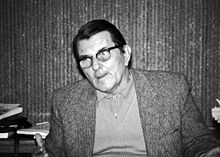Jacques Pâris de Bollardière
| Jacques Pâris de Bollardière | |
|---|---|

Jacques de Bollardière (right) on the plateau of Larzac , protesting against the extension of the military camp in the 1970s. A sa gauche, les philosophes non-violents Jean-Marie Muller et Lanza del Vasto.
|
|
| Born | 16 December 1907 Châteaubriant, France |
| Died | 22 February 1986 (aged 78) Talhouet, France |
| Allegiance |
|
| Service/branch | French Army |
| Years of service | 1930–1961 |
| Rank | Général de Brigade |
| Battles/wars |
World War II First Indochina War Algerian War |
| Awards |
Grand Officer of the Légion d'honneur Companion of the Liberation Distinguished Service Order |
Jacques Pâris de Bollardière (16 December 1907 in Châteaubriant, Loire-Atlantique – 22 February 1986) was a French Army general, famous for his non-violent positions during the 1960s.
Bollardière studied at the Military Academy of Saint-Cyr; he graduated in 1930 and due to insubordination, it was only with the rank of sergeant. (Saint-Cyr cadets normally graduate as commissioned officers, with the rank of sous-lieutenant). He was quickly promoted to sous-lieutenant and to lieutenant in 1932.
He joined the French Foreign Legion in February 1935 and was posted to Algeria until 1940.
In February 1940, Bollardière was assigned to the 13th Foreign Legion Demi-Brigade, and promoted to captain. He took part in the Battles of Narvik, and was back in Brest on the 13th of June. Seeing the debacle of the French armies, he crossed the Channel on a fishing boat and was among the very first to join Charles de Gaulle (the momentous rallying call that founded the Fighting French was broadcast on the 18th of that month); the Vichy regime sentenced him to death.
Bollardière fought in Gabon, and in Eritrea during the East African Campaign. Leading a 90-man strong party, he managed to seize and occupy an Italian fort in Massawa, taking over 300 prisoners. He was made a Compagnon de la Libération for this action.
Promoted to commandant (Major) in 1941, he took part in the capture of Damascus that summer. The following year, he took part in the Battle of Bir Hakeim, and the First Battle of El Alamein. He was severely wounded by a mine.
...
Wikipedia
